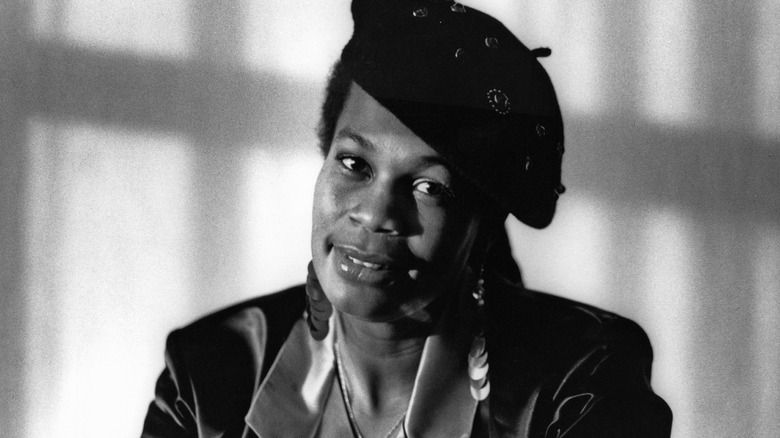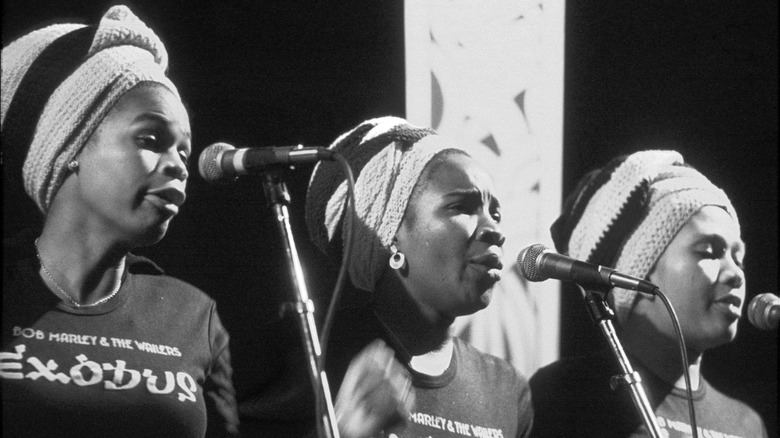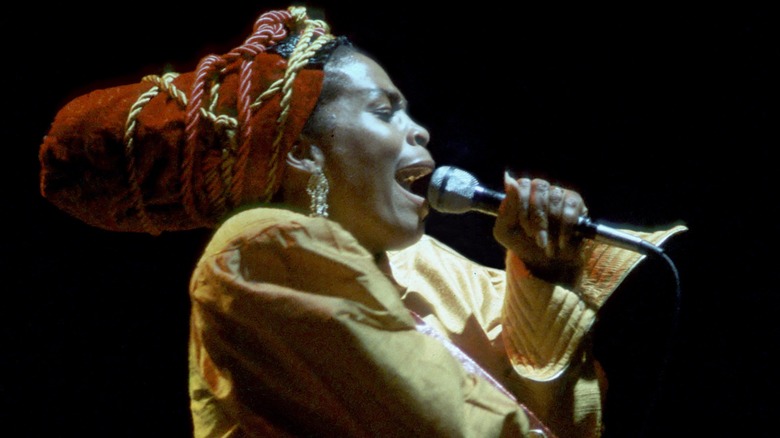Whatever Happened To Judy Mowatt, Bob Marley's Backup Singer?
In 1974, Judy Mowatt was a seasoned but obscure talent. She'd broken into the Jamaican music scene as a member of a female trio, the Gaylettes, then struck out on her own as a solo act. She was still pursuing a solo career when Marcia Griffiths invited her into the studio to contribute to one of her tracks. Also in the booth that day was Rita Marley. The instant chemistry between the three ladies birthed a new trio, the I-Threes; Rita's connections got them into performing with her husband, Bob Marley.
The I-Threes first sang backup for Marley and The Wailers on the single "Jah Live," then began touring with him in 1975, a gig they held until Marley's death in 1981. It was an informative experience for Mowatt, who recalled later (via Judy Mowatt Outreach Ministries) that Marley was a dedicated writer and performer who maintained a rigorous rehearsal schedule. Her time touring with him also had a spiritual component. "I had gotten to realize ... that this man was really Joseph in his second advent," she said in the 1990s (via AllMusic). "I saw in the man that this time he came not only with the physical corn to feed his people but he came with the spiritual corn, which was the message that transcended to the four corners of the world."
Marley may have changed the trajectory of Mowatt's life, but her musical and religious journey didn't stop with his death. Here is what she's been up to in the years since 1981.
Judy Mowatt made Jamaican music history with her album
The I-Threes continued to tour after Bob Marley died. For a time, they toured as a package deal with former members of The Wailers and Ziggy Marley and the Melody Makers. Judy Mowatt was happy to retain the associations, having bonded with her fellow I-Threes as friends as well as performers. But even before Marley's death, Mowatt took a huge step forward in her solo career.
Inspired by a visit to the United States, where she took in an exhibition on slavery, Mowatt recorded the album "Black Woman" in 1979 at Marley's Tuff Gong studio; it was the first album recorded there. It was also the first solo album produced by a woman in the history of Jamaican music. With contributions by a number of noted musicians, "Black Woman" has been called one of the best reggae albums ever written. Kings Music International dubbed it the greatest work done in the genre by a female artist.
Mowatt made history again in 1985 when she became the first woman nominated for a Grammy for a reggae album, "Working Wonders." Fourteen years later, she was honored by the Jamaican government with the Order of Distinction for her contributions to the country's musical heritage.
She converted to Christianity
A solo career didn't completely stop Judy Mowatt's work with musical groups. Besides the I-Threes, she also sang with Twelve Tribes of Israel, a reggae collective devoted to Rastafarianism. Mowatt herself was a devoted Rastafari for a good part of her life, having joined the religion in her early 20s. She told Cross Rhythms that she took great comfort in the Rastafari tradition and was devoted to its calls to repatriate Africa and make music. But gradually, "not by any one thing or by any one person," she said, Mowatt became dissatisfied with her spiritual life, a situation compounded by troubles in her personal life.
Mowatt credits hearing an interview with Haile Selassie I, ironically the man considered a messianic figure within Rastafarianism, with driving her to convert to Christianity; in the interview, Selassie denied any divine aspect, and Mowatt noted soon afterward that he was a Christian. Converting was a decision she says caused trouble with some from the Rasta community, compounded by her echoing the claim that Bob Marley underwent a deathbed conversion. Mowatt has often repeated the story that she heard about Marley's conversion from a friend whose sister worked in the hospital where he died, and from Marley's wife Rita.
Speaking to Young Voices, Mowatt admitted a problem with her story. "I think I've reminded [Rita] of that [conversation] and she said she didn't remember saying it," she said. Marley's religion is still a point of contention between the Rastafari community and the Ethiopian Orthodox Church. But Mowatt, who now focuses on gospel music, has stuck to her story.


